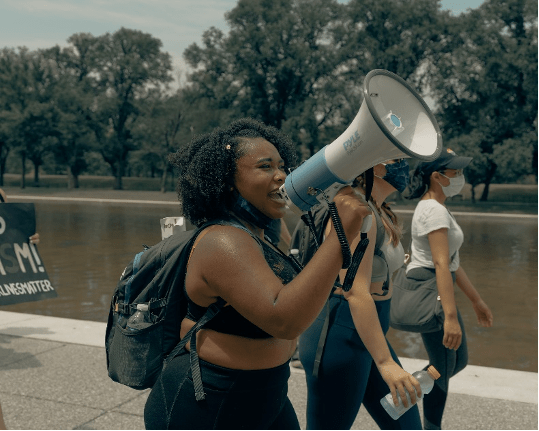By Tionne Paris
In August 2020, commentator Jorge Guarjardo tweeted that “Black women will save the United States”.[1] Whilst this statement was complimentary of black women’s ability to enact change, it highlights the unfair burden black women have been asked to shoulder throughout history. The American public vastly underestimate the political impact black women have had for centuries, despite the fact that political pundits credit the results of the 2020 Presidential election and the 2020 Georgia run-off elections as largely due to the efforts of black women. Although Rosa Parks is often heralded as an obvious example, black women have consistently led the charge for societal change.
As early as the 1890s, scholars of black history and society like W.E.B DuBois argued that black women’s agency is “a central component of black culture, consciousness and social organization.”[2] Briefly, the Reconstruction era allowed black men to vote, however black women were the backbone of that community, influencing black men to vote in ways that would improve life for the whole of the black community – holding them accountable. Historian Charlotte Gilkes states that:
“…although black women lacked money, they managed through their missionary societies and their clubs, through church participation and civic engagement – to bind together the black community and engage in social uplift.”[3]
From as early as the 19th century, then, black women in America have been key influences in building the infrastructure of black liberation.
Fast-forwarding to the 20th century, and the pivotal Civil Rights Movement, we find that the legacy of black women built through struggle and protest has been sanitized. Rosa Parks is remembered as a subdued figure –despite her ardent protesting as part of the NAACP prior to the Montgomery Bus Boycott – which was itself a highly coordinated protest. The Student Non-violent Co-ordinating Committee (SNCC) is often overlooked, although senior female members like Ella Baker were at its helm. Fanny Lou Hamer must be credited too for her leadership of the Freedom Democratic Society. All three women were responsible for mass boycotts, voter drives and organization of protests throughout the Civil Rights Movement.
Only a few years later, the Black Power Movement and its imagery aimed to liberate black men and women – with afro hair, for example, becoming a widespread cultural statement. Black women were integral to the functioning of the Black Panther Party (BPP), as women like Elaine Brown operated as Chairwoman of the Party. The BPP disseminated images of women with guns and men wearing aprons at the Children’s Breakfast Program – revolutionizing gender norms while providing for underprivileged children, both black and white. At the same time, the trial of Angela Davis was a touchstone moment. Davis became a revered icon of black women’s history as she became a target of the state. Her time served in prison became vital to historiographical understanding of their revolutionary struggle, and her writings like If They Come in the Morning: Voices of Resistance, published in 1971, were a key contribution.
In the tradition of those who came before, twenty-first century black women have spearheaded the #BlackLivesMatter movement, modelling Black Panther Party strategies as a decentralized organization with grassroots support and inspired by the prison abolitionist rhetoric of Angela Davis. Already, it has pushed for legislation like the BREATHE act, which would divest taxpayer money from policing to reinvest in community-based approaches to public safety.[4] In addition to this push for national change, black women have organized mass voter drives on a state-by-state level. Georgia’s Stacey Abrams, Mobilize Detroit’s Wendy Caldwell-Lidell, and countless others are drawing directly from the blueprints of black women who came before through their push for the growth of democratic participation within the black community.
The current civil unrest that we have seen under the Trump administration has necessitated, as always, the influence of black women on local and national politics. However, we must remember that this is not the first time, and it certainly will not be the last. There should be a duty, when thanking black women, to also encourage voter participation and political action from all races. American society should not expect black women to save them; they should be inspired by the legacy of black advocacy for their own communities to save themselves.
[1] J., Guajardo, Twitter, 2020: https://twitter.com/jorge_guajardo/status/1295556454473256961.
[2] W.E.B., Dubois, in C.T., Gilkes, Three Great Revolutions: Black Women and Social Change, Berkeley Journal of Sociology, pg.51.
[3] Ibid, pg.54.
[4] For more information, see: https://breatheact.org/.
Image credits: http://unsplash.com/
